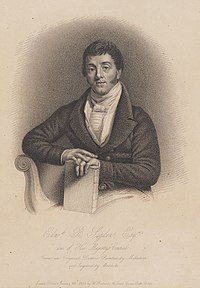Edward Burtenshaw Sugden
|
The Right Honourable The Lord Saint Leonards PC |
|
|---|---|
 |
|
| Lord Chancellor of Ireland | |
|
In office 1835–1835 |
|
| Monarch | William IV |
| Prime Minister | Sir Robert Peel, Bt |
| Preceded by | The Lord Plunket |
| Succeeded by | The Lord Plunket |
|
In office 1841–1846 |
|
| Monarch | Victoria |
| Prime Minister | Sir Robert Peel, Bt |
| Preceded by | The Lord Campbell |
| Succeeded by | Maziere Brady |
| Lord Chancellor of Great Britain | |
|
In office 27 February 1852 – 17 December 1852 |
|
| Monarch | Victoria |
| Prime Minister | The Earl of Derby |
| Preceded by | The Lord Truro |
| Succeeded by | The Lord Cranworth |
| Personal details | |
| Born | 12 February 1781 |
| Died | 29 January 1875 (aged 93) |
| Nationality | British |
| Political party |
Tory Conservative |
| Spouse(s) | Winifred Knapp (d. 1861) |
| Alma mater | None |
Edward Burtenshaw Sugden, 1st Baron Saint Leonards PC (12 February 1781 – 29 January 1875) was a British lawyer, judge and Conservative politician.
Sugden was the son of a high-class hairdresser and wig-maker in Westminster, London.
After practising for some years as a conveyancer, Sugden was called to the bar at Lincoln's Inn in 1807, having already published his well-known Concise and Practical Treatise on the Law of Vendors and Purchasers of Estates. In 1822 he was made King's Counsel. He was returned at different times for various boroughs to the House of Commons, where he made himself prominent by his opposition to the Reform Bill of 1832. He was appointed Solicitor General in 1829, receiving the customary knighthood. As Solicitor-General he took a narrow view of Jewish emancipation, arguing that "They had possessed nothing; they held nothing. They had no civil rights; they never had any."
In 1835 he was Lord Chancellor of Ireland, and again from 1841 to 1846. In 1849, Sugden published 'A Treatise on the Law of Property as administered in the House of Lords', in which he criticised the decisions given in the House of Lords when acting as a Court of Appeal. In Lord Derby's first government in 1852 be became Lord Chancellor of Great Britain and was raised to the peerage as Baron Saint Leonards, of Slaugham in the County of Sussex. In this position he devoted himself with energy and vigour to the reform of the law (note his important dissenting opinion in Jorden v Money (1854) 5 HL Cas 185); Lord Derby on his return to power in 1858 again offered him the same office, which from considerations of health he declined. He continued, however, to take an active interest especially in the legal matters that came before the House of Lords, and bestowed his particular attention on the reform of the law of property. He championed the fulfilment of the will of J. M. W. Turner with regard to his art bequests in 1857–70. His view on that was supported by Leolin Price in 2006.
...
Wikipedia
